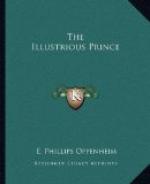“And what is the thing that lies behind them?” she asked.
“A theory, madam,” the Inspector answered,—“no more. But in this case, unfortunately, we have not passed the stage of theories. My theory, at the present moment, is that the murderer of these two men was the same person.”
“You have evidence to that effect,” she said, suddenly surprised to find that her voice had sunk to a whisper.
“Very little,” Mr. Jacks admitted; “but, you see, in the case of theories one must build them brick by brick. Then if, after all, as we reach the end, the foundation was false, well, we must watch them collapse and start again.”
“Supposing we leave these generalities,” Penelope remarked, “and get on with those questions which you wish to ask me. My aunt, as you may have heard, is an invalid, and although she seldom leaves her room, this is one of the afternoons when she sometimes sits here for a short time. I should not care to have her find you.”
The Inspector leaned back in his chair. It was a very pleasant drawing room, looking out upon the Park. A little French clock, a masterpiece of workmanship, was ticking gayly upon the mantelpiece. Two toy Pomeranians were half hidden in the great rug. The walls were of light blue, soft, yet full of color, and the carpet, of some plain material, was of the same shade. The perfume of flowers—the faint sweetness of mimosa and the sicklier fragrance of hyacinths—seemed almost overwhelming, for the fire was warm and the windows closed. By the side of Penelope’s chair were a new novel and a couple of illustrated papers, and Mr. Jacks noticed that although a paper cutter was lying by their side the leaves of all were uncut.
“These questions,” he said, “may seem to you irrelevant, yet please answer them if you can. Mr. Hamilton Fynes, for instance,—was he, to your knowledge, acquainted with Mr. Richard Vanderpole?”
“I have never heard them speak of one another,” Penelope answered. “I should think it very unlikely.”
“You have no knowledge of any common pursuit or interest in life which the two men may have shared?” the Inspector asked. “A hobby, for instance,—a collection of postage stamps, china, any common aim of any sort?”
She shook her head.
“I knew little of Mr. Fynes’ tastes. Dicky—I mean Mr. Vanderpole—had none at all except an enthusiasm for his profession and a love of polo.”
“His profession,” the Inspector repeated. “Mr. Vanderpole was attached to the American Embassy, was he not?”
“I believe so,” Penelope answered.
“Mr. Hamilton Fynes,” the Inspector continued, “might almost have been said to have followed the same occupation.”
“Surely not!” Penelope objected. “I always understood that Mr. Fynes was employed in a Government office at Washington,—something to do with the Customs, I thought, or forest duties.”
Mr. Jacks nodded thoughtfully.




